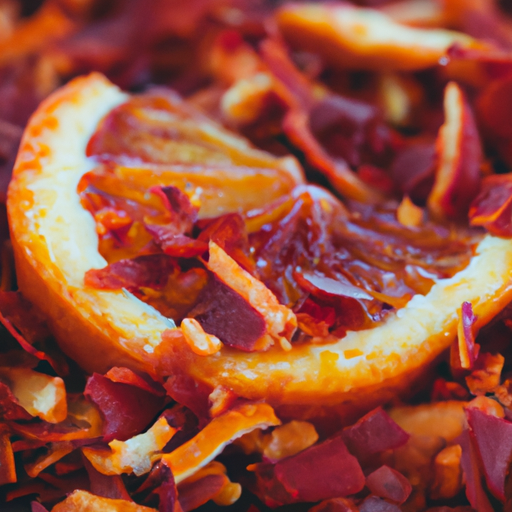Discovering the Vibrant Flavor of Blood Orange Zest
If you’re looking to elevate your culinary creations with a burst of citrusy goodness, then blood orange zest is a must-have ingredient in your kitchen arsenal. With its vibrant hue and distinctive flavor, this little gem of nature adds depth and character to countless dishes. Let’s delve into the world of blood orange zest and discover why it has become a beloved ingredient among chefs and food enthusiasts alike.
Unveiling the Flavor Palette
The taste of blood orange zest is both tantalizing and unique. It brings together the tangy notes of regular oranges with a subtly sweet and berry-like undertone. The zest adds a complex layer of flavor that enchants the palate, making it a versatile ingredient in culinary explorations.
Unlocking Culinary Potential
Once you experience the delightful flavor of blood orange zest, you’ll find yourself eager to incorporate it into a wide range of dishes. Its applications are only limited by your imagination. Here are a few popular uses to get your creative juices flowing:
Baked Goods: Add a touch of vibrant zest to cakes, cookies, and muffins to infuse them with an irresistible citrusy aroma.
Sauces and Dressings: Be it a marinade, vinaigrette, or barbecue sauce, blood orange zest imparts a zesty kick to take your sauces to the next level.
Seafood and Poultry: Elevate the flavor profile of dishes like grilled salmon or roasted chicken by sprinkling a hint of blood orange zest over them for a refreshing twist.
Cocktails and Beverages: The zest serves as a fantastic addition to cocktails, mocktails, and infused water, imparting a lively citrus essence.
Nutritional Powerhouse
Besides its delectable taste, blood orange zest packs a nutritional punch that adds to its appeal. High in vitamin C, antioxidants, and dietary fiber, it contributes to a healthy diet. Including blood orange zest in your culinary creations not only enhances flavor but also provides potential health benefits.
A Slice of History and Intriguing Facts
The fascinating history of blood orange zest spans centuries, originating in the ancient Mediterranean region. Rich in symbolism, these vibrant fruits have been considered a precious gift throughout history. The distinct red pigmentation of the zest arises from anthocyanins, which are powerful antioxidants abundant in blood oranges.
It’s worth noting that blood oranges are often associated with Sicily, where they flourished due to the region’s unique climate and soil conditions. Today, Italy remains one of the main producers of these vibrant citrus fruits.
In Conclusion
Blood orange zest, with its vivid color and captivating flavor, adds a magical touch to numerous culinary creations. From desserts to savory dishes and everything in between, this versatile ingredient provides an exciting twist to traditional recipes. So the next time you want to infuse your dishes with a burst of citrusy charm, don’t forget the delightful allure of blood orange zest. Embrace this exquisite ingredient and elevate your culinary repertoire to new heights!
Origin: Blood oranges (Citrus sinensis) are believed to have originated in Sicily, Italy. They are a natural mutation of the sweet orange group, with the blood orange variety named for its bright red or deep crimson flesh.
Common Uses: Blood orange zest, which is the outermost layer of the peel, is commonly used as a flavoring and garnish in various culinary applications. It has a distinct and vibrant citrus aroma, which adds depth and complexity to many dishes. Blood orange zest is often used in desserts, such as cakes, tarts, and sorbets, as well as in savory dishes like salads, marinades, and sauces.
Nutritional Benefits: Blood orange zest contains various beneficial nutrients. It is rich in vitamin C, which supports immune function and acts as an antioxidant. Additionally, it provides dietary fiber that aids in digestion and contributes to a healthy gut. Blood orange zest also contains small amounts of vitamins A, B vitamins, potassium, and calcium.
Unique Properties: Blood orange zest is valued not only for its vibrant crimson color but also for its unique flavor profile. It has a slightly sweeter and more floral taste compared to regular orange zest, with subtle raspberry or berry-like undertones. This distinct flavor makes it a popular choice for enhancing both sweet and savory dishes.
Historical Significance: The cultivation of blood oranges dates back to ancient times, where they were highly regarded for their rich color and unique taste. Blood oranges were often considered a luxury fruit and were associated with wealth and nobility. The first recorded mention of blood oranges dates back to the 17th century in Italy, and they have since become highly sought after in various cuisines around the world. Today, blood orange zest continues to be valued for its vibrant color and distinctive flavor.




Use the share button below if you liked it.
It makes me smile, when I see it.